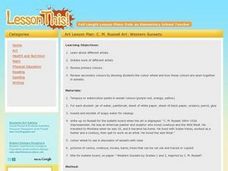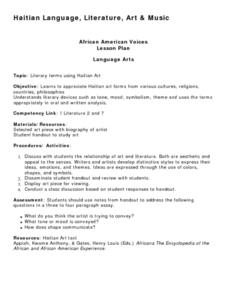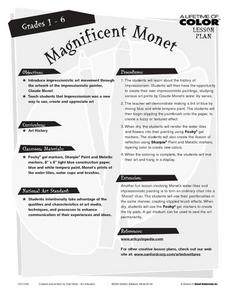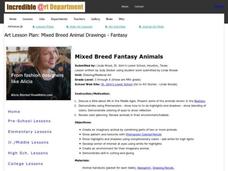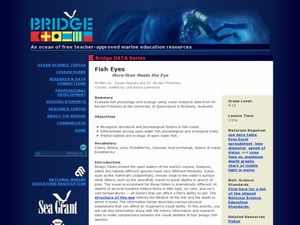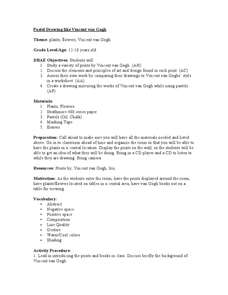Curated OER
Remote Sensing
Ninth graders participate in a variety of activities designed to reinforce the concept of light and the electromagnetic spectrum. They research and analyze data from remotely sensed images. They present their findings in a PowerPoint...
Curated OER
Tessellation Design And Construction
Students study the basic elements and concepts of the visual art's perceptual component - such as shape, line and color. They create tessellations that foster problem solving and reflective thinking.
Curated OER
Musical Rhythm Instruments
Students design a unique instrument using containers, beans, markers, crayons and colored construction paper. At the end of the instructional activity each student have a working rhythm instrument decorated with at least two colors.
Curated OER
Enlightening Explorations, Part III
Sixth graders continue their examination of light. In groups, they make rainbows and examine the spectrum of visible light. They travel between various stations recording their observations about the behaviors of light. To end the...
Curated OER
All Those Seeing Color, Say Eye!
Students discuss feelings and explore how to recognize how they are feeling. In this exploratory instructional activity students discuss conflict and ways to resolve problems.
Curated OER
Western Sunsets
Students observe and paint sunsets. In this sunsets lesson plan, students look outside and at pictures of sunsets, paint sunsets using water color or tempura paint, and cut out silhouettes from black paper and insert them into the painting.
Curated OER
How Hot Is It?
Sixth graders use paper cups, black and white lining, thermometers and plastic wrap to conduct an experiment that measures the energy-collecting capacity of various colors. They graph the results.
Curated OER
African American Voices
Students investigate the many forms of Haitian art. They compare the art of some different cultures, religions, countries, and philosophies. Students also read the biography of an artist to build context for a particular piece of...
Curated OER
All Those Seeing Color, Say Eye!
Students research and discuss the roles of the eye and brain in the perception of color. They watch a slideshow and complete a worksheet.
Curated OER
Magnificent Monet
Students research the water lily paintings of Claude Monet and the impressionistic art period. They create their own impressionistic art works and display them in the classroom.
California Mathematics Project
Reflections
Reflections are the geometric mirror. Pupils explore this concept as they discover the properties of reflections. They focus on the coordinates of the reflections and look for patterns. This is the third lesson in a seven-part series.
Curated OER
Earth's Winds, Crust, and Atmosphere
This site provides a variety of activities and worksheets about the problem-based learning activity about Earth and its atmosphere. The lessons can be used separately or together in a geology unit. The resources and charts are very...
Curated OER
Mixed Breed Fantasy Animals
Ever seen a crockapeep or a giraffule? How about a catmel? Elementary school artists are encouraged to let their imaginations roam and create images of imaginary creatures by combining parts of two or more animals,
Curated OER
Hot, Hot, Hot, Cold
Learners dance the image of falling snow. They move, swing, fall, and rise to music working to depict snow falling, the sun, and high/low movements. This is a well-thought out lesson that aids them in seeing movement as a form of...
Curated OER
Fast Fact-Finding
Ever wonder why the sky changes color so often? Readers examine an informational excerpt from John Farndon's How the Earth Works. They underline key points as they read and then answer five response questions. Prompts review main points,...
Sargent Art
Picasso and Beyond!
After reviewing the life and art of Pablo Picasso, learners set out to create abstract, cubist, relief portraits. They'll draw, color, paint, and cut out portraits just like the ones Picasso created. The lesson is extremely well written...
National Nanotechnology Infrastructure Network
Making a Liquid Crystal Thermometer
Introduce your classes to a fourth state of matter! Liquid crystals have a colorful sheen that changes based on different physical factors. Learners use this information to create a liquid crystal thermometer where the color of the...
Math Solutions
Shape Sorting: Looking for Green!
Young mathematicians rotate, flip, and sort their way to an understanding of the different attributes of geometric figures. Using transparent yellow and blue shapes, children try to match congruent figures together to create...
Sunlight Cal-Tech
Chromatography of Plant Pigments
Through a hands-on activity, an acetone-spinach solution is pre-made and learners use this solution to separate the pigments found in spinach using chromatography. The comprehensive resource includes an analysis and conclusion questions.
Curated OER
Fish Eyes - More than Meets the Eye
Inform your class about the adaptations in fish eyes: cones, lens size, endothermy, and speed of vision. The adaptations are related to diving behavior. Junior marine scientists compare the adaptations of four different fish species to...
Curated OER
Colored Pencil Value Practice
Budding artists discover what color value means with regard to art. They read the definition of color value at the top of the page, choose three different colored pencils, then use the provided spaces to create color values with each. By...
Curated OER
Pastel Drawing like Vincent Van Gogh
Learners discuss the elements of art and design found in a series of flower paintings by Vincent Van Gogh. They explore art, shading, and color as they create mirrored representations of the master's art, using oil pastel.
Curated OER
Punctuating a Paragraph
Do your fourth graders need a little help with punctuation? Use this run-on paragraph to demonstrate proofreading for capitalization, punctuation, and separating ideas into separate paragraphs. At the end of the activity, learners...
Dick Blick Art Materials
Torn Metal Collage
The work of Austrian artist Gustav Klimt is used to inspire kids to create their own mixed media works. Although designed for the special education classroom, the activity is sure to inspire all kids.







